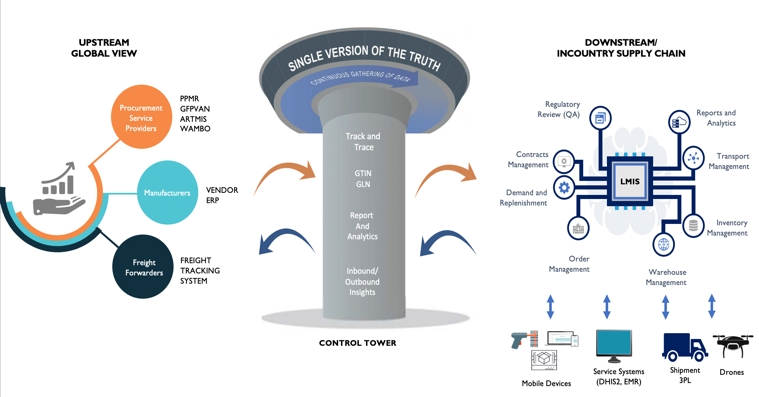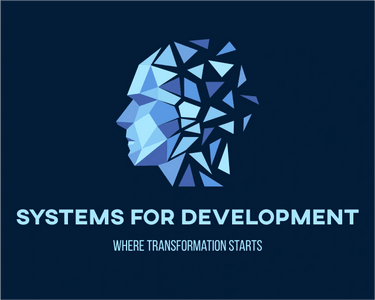
Supply chain control towers have been in existence for a while, significantly contributing to the transformation of both strategic and operational management of supply chains. They form centralized information hubs for facilitating end to end visibility across value chains, with the intent to promote supply chains agility and provide capabilities to capture and process data in real time.
Control Towers, where successfully implemented have significantly improved supply chain performance. By using real-time data, they facilitate both predictive and prescriptive analysis and ultimately enables the identification of weaknesses and strengths within supply chains, resulting in information sharing and collaboration. They have provided information that guides value chains towards greater efficiency and improved processes and enable effective and efficient decision making. through the implementation of its Integrated Logistics Management System (GhiLMIS) is looking at ways to improve visibility and analytics to facilitate decision making across the enterprise.

It is believed that by enabling this capability, Ghana will be able to instantly aggregate data from its supply chain inventory, multiple warehousing centers and 3rd Party Logistic entities to guide improvements in the supply chain, leading to reduction in overall inventory operation costs, mitigation of any exceptions with an efficiency and gaining traction in achieving the Ministry of Health sustainable development goals like universal health care.
Extending the functionality of the GhiLMIS to enable Control Tower capabilities, Ghana has built a platform that facilitates effective management of business information service, supply and demand planning, supports analytics, and monitoring of Key Performance Indicators (KPIs) across the value chain.
This capability allows the Ministry of Health Ghana, to have end to end visibility across the value chain, facilitate information sharing across all key entities and systems, and provides a flexible interface for all supply chain partners suppliers, 3PLs, development partners, local manufactures and clients.
It is believed that this platform will facilitate supply chain data integration leading to effective management of Ghana resources, enabling both systems and processes to function effectively and efficiently. The solution is value driven, easy to use, designed to share, and sustainable. In a short period of its implementation, it has facilitated easy access to supply chain data and provided real-time analytics, enabling the MoH to:
- Establish end to end near real time visibility of all supply chain data to all key stakeholders
- Reduce inventory operation costs, with the ability to predictively identify risks and exceptions
- Increase the collaborative capabilities between all entities, within in-country supply chain actors and global partners
- Proactively respond to and resolve all supply chain disruptions in near real time
- Leverage both predictive and prescriptive data to improve demand and supply planning, inventory management, operational costs, warehouse holding costs, optimize transportation, capacity management and overall decision-making
The key elements that formed the foundation this successful implementation included:
- Data Standardization – to achieve interoperability across the Ghana eco-system, the GhiLMIS project leveraging Global Standards, pioneered the development and implementation of supply chain classifications to facilitate multiple system connections, thus enabling systems to be used collectively to enhance the quality and amount of data available to support supply chain operational processes and decision making, effective analytics and improving the ability to roll-up or drill down into commodity-related information.
- End to End Visibility – The GhiLMIS is built on ONE Network platform technology, an agnostic data integration solution, which embraces legacy technology platforms and multiple data sources making it possible to see the entire end to end value chain transactions in real-time. Additionally, the ONE technology supports management of chain of custody of items, enhanced data integrity and visibility throughout the supply chain, from the central medical store down to patient-level consumption at service delivery points.
- Integration to In-Country and Global Solutions – The solution has been integrated with 3PLs to facilitate shipment tracking, capacity management and route optimization. Plans are underway to integrate GhiLMIS with in-country eHealth solutions within the Ghana eHealth ecosystem like DHIS2, HMIS and Global Solutions like GFPVAN. This integration when completed with facilitate the sourcing of multiple sources of data, triangulation and analysis, supporting decision making.
- Analytics – The GhiLMIS supports easy access to data and has created abilities to Find, Trace, Extract, Distribute and Use data to drive improved health outcomes through both predictive and prescriptive analytics. The GhiLMIS uses policies and historical data to predict events and demand sensing abilities to support demand planning.
- Collaboration and Workflow Management – The GhiLMIS platform supports integration and workflow coordination at every stage of the supply chain, recognizing the interdependencies between how the activities at the last mile, impact upstream activities and vice versa. These workflows facilitate seamless collaboration between different tiers making decision making informed and efficient.
It is believed that this transformational approach to public health supply chain management, will significantly improve efficiencies, reduce costs, optimize operations and facilitate strategic decision-making, supporting countries achieve their public health goals. Ghana is one of the pioneers of using data as a business asset and establishing a culture of data use in public health supply management critical decision making. The Control Tower will play a major role in achieving this objective.
